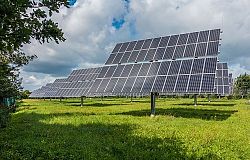

An appeal relating to an application for a 40 hectare solar farm in Shropshire was recovered after invention by the Secretary of State.
In 2021 Greentech Invest UK Ltd had their application for their solar farm refused by Telford and Wrekin Co-operative Council. The council's main refusal was on the grounds that the solar farm would have a negative impact on the landscape. The site in question is situated within the Wrekin Forest Strategic Landscape (WFSL) and lies near the Shropshire Hills Area of Outstanding Natural Beauty.
The solar farm would be built upon a recently backfilled, opencast mine, and decommissioned after 40 years. It is approximated that the farm would generate on average 28,570,000KWh a year. This is enough to power 8,657 homes and would save 15,142 tonnes of CO2 emissions annually.
On appeal planning inspector Mike Robins agreed with the Council that the site in question was integral to the WFSL and acted as a 'gateway' to the wider landscape. He ruled that the solar farm would 'fundamentally change' the appeal site, adding that it would "materially affect the attractiveness of the recreational resources provided here and extend the distance for local people seeking the natural beauty and remoteness of the AONB and Wrekin forest landscape."
It was acknowledged that there were obvious benefits from the solar farm in terms of renewable energy however Robins recommended the appeal should be dismissed, stating "While the overall thrust of government policy may be in favour of renewable sources, this does not give them primacy over the other demands."
The Secretary of State, with Lee Rowley, Under-Secretary of State for Local Government and Building Safety acting on their behalf, intervened to recover the appeal of this decision on the basis of the government's new directives on proposals of major significance in terms of energy policy.
Mr Rowley did not come to the same conclusion as the planning inspector. Whilst he acknowledged that there would be harm on the landscape from the solar farm, the actual impact would be 'very limited', arguing that the site was not an important 'gateway' to the surrounding area.
He ultimately ruled that the significant benefit in terms of renewable energy production that would come from the solar farm development outweighed any harm to the surrounding landscape and allowed the appeal.